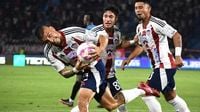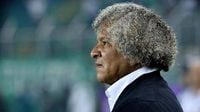There was no shortage of drama, tension, and controversy at Estadio Palmaseca on October 20, 2025, as the clásico vallecaucano between Deportivo Cali and América de Cali delivered not just a fiercely contested Liga BetPlay II 2025 match, but also a violent incident in the stands and swirling rumors about a seismic shift in América’s ownership. For the thousands of fans who packed the stadium, the night will be remembered for more than just the 0-2 scoreline in favor of the visiting América de Cali.
On the pitch, América de Cali emerged victorious, thanks to goals from Cristian Barrios and Josen Escobar—though some reports also credit Michael Barrios for a tally in the match. The win propelled América to 20 points with four matches to go, keeping them firmly in the hunt for a top-eight finish and a coveted spot in the Liga BetPlay quarterfinals. Deportivo Cali, meanwhile, found themselves stuck in 12th place, also on 20 points, but with a negative goal difference and mounting pressure as the season’s final stretch approaches.
But the action on the field was almost overshadowed by what occurred in the stands. During the second half, a violent altercation broke out when a man, reportedly an América supporter, was discovered among the Deportivo Cali faithful. According to multiple sources, the man was quickly set upon by several Cali fans, who delivered punches and kicks as he tried desperately to defend himself. The situation escalated rapidly, forcing police to intervene. Officers surrounded the injured man and managed to extract him from the crowd, preventing further harm. While details about his condition remain scarce, it was confirmed that he sustained injuries in the attack.
The disturbing incident was widely circulated on social media, sparking renewed debate about fan violence in Colombian football. Authorities and club officials have yet to issue comprehensive statements, but the episode has cast a shadow over what was otherwise billed as one of the season’s marquee fixtures.
On the field, the match unfolded with all the tension and urgency one expects from a clásico. Deportivo Cali started brightly, with Michael Aponza hitting the post in the opening minute, but América quickly settled and began to dictate the rhythm. The breakthrough came in the 27th minute, when Cristian Barrios finished off a flowing move with a right-footed shot from the center of the area, giving the visitors a 1-0 lead. The goal was the product of a precise assist from Luis Ramos, and it seemed to sap some of the early energy from the home crowd.
Despite several attempts by Deportivo Cali to claw their way back into the contest—most notably through Avilés Hurtado, Johan Martínez, and Fernando Mimbacas—the América defense held firm. The home side’s lack of clinical finishing, a recurring theme this season, once again proved costly. According to the official match commentary, Deportivo Cali registered numerous shots, but only a handful truly troubled América’s goalkeeper.
The second half saw América consolidate their advantage. In the 62nd minute, Josen Escobar doubled the lead for the visitors with a powerful right-footed strike from outside the area, assisted by Jan Lucumí. From that point on, América managed the game effectively, making timely substitutions and absorbing pressure as Deportivo Cali grew increasingly desperate. Late yellow cards for Yeison Gordillo and Johan Martínez reflected the mounting frustration among the home players.
After the final whistle, Deportivo Cali’s head coach Alberto Gamero did not mince words. Facing the media, Gamero admitted, “It’s hard for us. Even more so to see a full stadium and not be able to bring satisfaction to our fans. Shame and embarrassment, but we will keep fighting.” He went on to shoulder responsibility for the defeat, but also offered a note of hope: “Despite the defeats, we’ve played good games. We were not inferior, just less effective. This team proposes and seeks to win. We will give everything to get into the top eight.”
Gamero’s candor resonated with many supporters, who had turned out in force to back their team in one of the most important matches of the campaign. The loss, however, leaves Deportivo Cali in a precarious position. With 20 points from 16 matches (five wins, five draws, six losses) and a negative goal difference of -3, their path to the quarterfinals is now a steep one. The team must navigate four remaining fixtures—home games against Alianza FC and Once Caldas, and away trips to Deportes Tolima and Independiente Santa Fe—needing to collect points in almost every outing to keep their hopes alive.
“The team generates chances, but we lack the necessary finishing,” Gamero acknowledged, pointing to a season marked by inconsistency and defensive lapses. “Each game will be a final, and the fans know it.” The coach’s rallying cry is aimed at reinforcing the bond between the team and its supporters, who have endured a rollercoaster campaign filled with highs and lows.
For América de Cali, the victory was not just a boost in the standings, but also a moment of validation amid swirling off-field rumors. On the eve of the match, journalist Jaime Dinas dropped what he called a “bombshell” revelation: former Spanish footballer Iago Falque had reportedly invested a substantial sum in América de Cali, gaining operational and executive control of the club. According to Dinas, Falque’s involvement comes with three major demands that would reshape the club’s leadership, possibly affecting the share package of current president Marcela Gómez. While similar rumors surfaced in September and were denied by Falque at the time, Dinas remains adamant about the veracity of his claims, even anticipating official denials.
If confirmed, Falque’s arrival—potentially alongside club legend Adrián Ramos—could signal the dawn of a new era for América de Cali, a club long accustomed to power struggles and boardroom intrigue. For now, however, the reports remain unverified, and club officials have yet to comment publicly on the matter.
As the dust settles on a clásico filled with emotion, controversy, and speculation, both teams face pivotal moments in the weeks ahead. América de Cali, buoyed by their win and perhaps on the cusp of major change, will look to build on their momentum. Deportivo Cali, meanwhile, must regroup quickly if they are to salvage their season and reward their loyal fans with a late push for the quarterfinals. One thing is certain: in Colombian football, the drama never stops.






